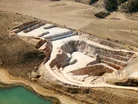Aguia gets construction licence for Brazil phosphate project

Aguia Resources, the Australian multi-commodity company, has announced that it has been granted the construction licence for the development of a phosphate project in the state of Rio Grande do Sul in Brazil.
Phosphate project to produce organic phosphate fertiliser
Aguia said that the Tres Estradas phosphate project (TEPP) will produce organic phosphate fertiliser, which is also commonly known as Direct Application Natural Fertiliser (DANF). The company added that after the ramp-up period of the mine and processing plant, it expects production to be around 300,000 tonnes per year, over the 18-year life of the mine.
The Rio Grande do Sul is one of the largest grain producing areas in Brazil, with 100% of the phosphate supply coming from imports, the statement said. There is demand for 2,440,000 tonnes of phosphate fertiliser per annum (10% P₂O₅) within a 300km radius of the TEPP site, Augia said, adding that the project will help address that imbalance.
Furthermore, Augia added that the State Secretary for the Environment described the project as emblematic in terms of its positive environmental and social aspects. It pointed to the processing plant as an example of this, as it is in the process of being certified as triple net-zero by EDGE, a green building certification system developed by the International Finance Corporation, which is part of the World Bank.
Augia stated that the licence provides the necessary authorisation to initiate construction and start development of the mine site, representing a substantial de-risking in the path to production. The next phase in the permitting process will be the operation licence, it added.
The TEPP is an open pit and shovel operation with a very low strip ratio of 0.50:1 for an 18-year life of mine (LOM). The processing required to produce a natural phosphate fertiliser product is very simple, consisting of only crushing and milling. There is no need for a tailings dam, the company said.
It added that the decision to produce a natural phosphate fertiliser product from the Três Estradas Phosphate Project drastically reduced the infrastructure and CAPEX required to commence production.
The processing plant layout includes a primary crusher and six secondary hammer mills. After milling, the product will be transported to the warehouse through a conveyor belt and tripper car system.
Environmental mining standards
This will include a site inspection conducted before the opening of the mine and processing plant, to ensure that it has followed the approved design and complies with environmental, safety, health and mining standards, it explained.
In addition, there is also the project’ environmental permitting which is currently under discussion in a public civic action sponsored by the Brazilian Federal Public Prosecutor’s Office, Augia said, adding that although there has been a favourable first decision, there is still an injunction request which could prevent the company from starting construction until the court issues a ruling.
The Três Estradas Phosphate Project is a low capital expenditure and low operating expenditure project that will produce a natural phosphate fertiliser product which has achieved yields of up to 98% of those returned using significantly more expensive conventional phosphate fertilisers, Augia said.
The company said it holds claims over other phosphate targets, totalling 12,812 hectares, that are in close proximity and display similar geophysical characteristics to the TEPP project, and that there is the potential to add a resource upside to the project.



